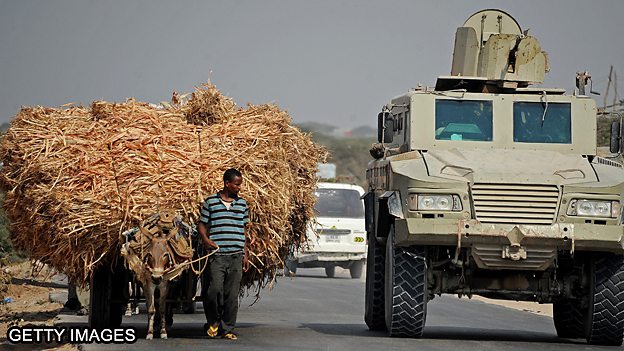
By Abdullahi Yusuf Osman
Somalia has attractive oil prospects, with reserves which some say could make it one of the world’s major producers.
After decades of conflict, recent improvements in security and a decline in piracy off the coast of Somalia have allowed foreign oil companies to start exploration activities there.
But investment in this sector is being jeopardised by chronic squabbling between central and regional authorities, in the absence of a formal regulatory structure in the federal state.
They disagree over the right to issue licences to oil companies and the central government has now asked foreign companies operating “illegally” in the country to cease their operations.
Mogadishu vs the regions
The row over licences erupted when it emerged that some oil companies were signing deals for oil exploration with regional authorities while others dealt with the central government. The central government naturally wants all oil companies to sign with the authorities in Mogadishu. This was done by the British oil giant, BP and another British company, Soma Oil.
In particular, the government in Mogadishu has challenged deals inked with the semi-autonomous region of Puntland. The region’s coast is thought to hold large oil reserves. Puntland however declared itself autonomous in 1998 and has been hostile towards the central government. It has often threatened to completely cut ties with Mogadishu.
Amid the row, Canada’s Africa Energy Corp announced its withdrawal from Puntland. In its notice to Puntland’s oil regulator in June, it cited “disagreement between the Somalia central government and Puntland over the legitimacy of productions sharing agreements.”

Oil law
Unlike the central government, the Puntland administration has its own agency that issues licences. It is called the Puntland Petroleum and Mineral Agency (PPMA).
The region also has an oil law that expressly bars the central government from involvement in its budding oil sector. The law prohibits individuals and entities from discussing, negotiating or representing “the Puntland government in hydrocarbon and/or minerals operations in any part of Puntland territory, onshore or offshore, to any Somali or foreign company”.
The central government on the other hand currently has no law guiding oil exploration, although the cabinet has just approved a new draft bill that is awaiting parliamentary approval. And in March, UN sanctions experts accused Soma Oil of making corrupt payments to the Somali oil ministry – accusations which the company has denied.
Puntland standing firm
Puntland says it will not “recognize any petroleum law drafted by an illegal ministry, passed by a Somali executive branch that does not have the constitutional power to do so”.
The central government is also unhappy about deals with Somaliland in the north. The territory declared itself independent in 1991 and has successfully governed itself since then. But the Mogadishu government considers it to be part of Somalia and says deals with Somaliland should have gone through Mogadishu.
Among those that have signed with the government of Somaliland are DNO International ASA of Norway, the UK-based Genel Energy Plc and Liberty Petroleum from the United States.
The tensions over licences threaten to worsen the already chilled relationship between Mogadishu and its regions, and could be a blow to the growth of the economy that is so desperately needed.

_____________________________________________________________________________________
Xafiiska Wararka Qaranimo Online | Mogadishu, Somalia
_____________________________________________________________________________________Advertisement
_____________________________________________________________________________________







